2025年广东省深圳市中考英语——语法填空新题目训练(含解析)
文档属性
| 名称 | 2025年广东省深圳市中考英语——语法填空新题目训练(含解析) | 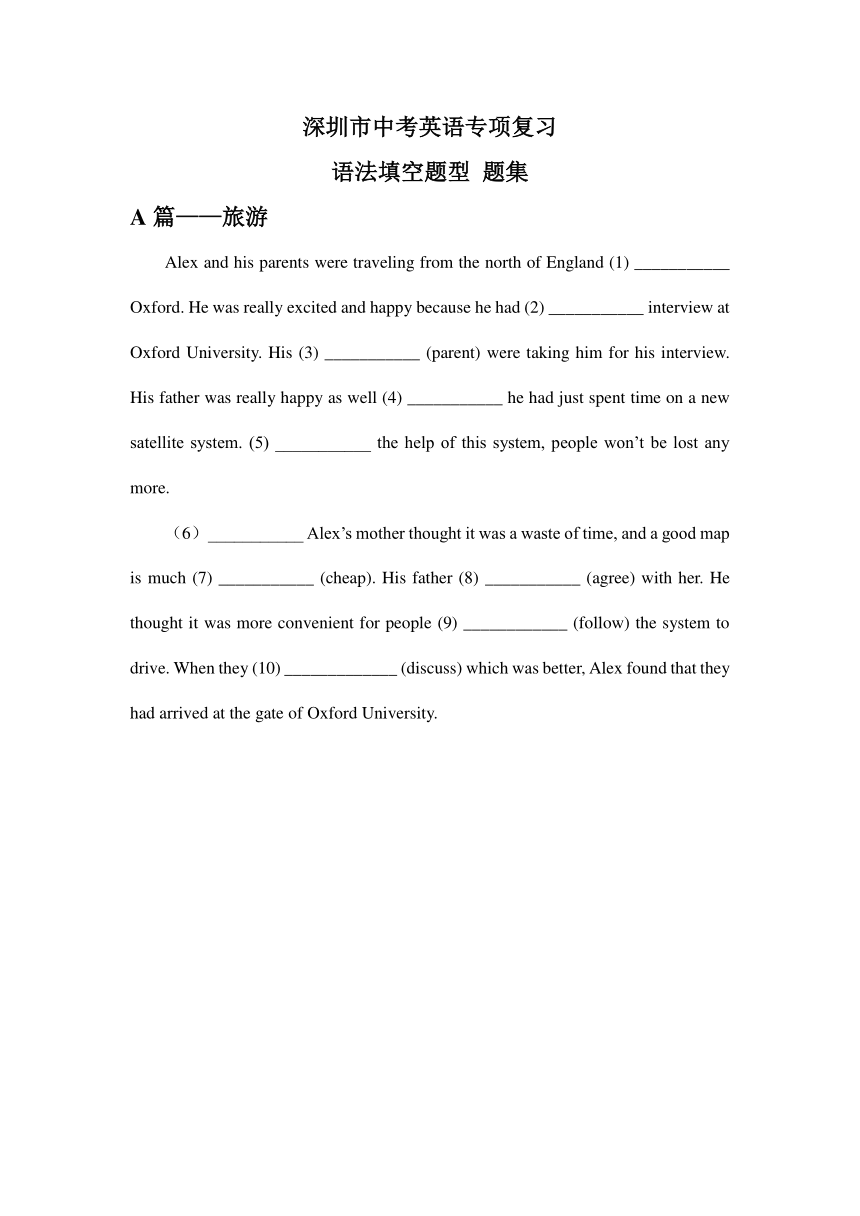 | |
| 格式 | docx | ||
| 文件大小 | 25.9KB | ||
| 资源类型 | 教案 | ||
| 版本资源 | 人教版 | ||
| 科目 | 英语 | ||
| 更新时间 | 2025-05-07 12:18:22 | ||
图片预览

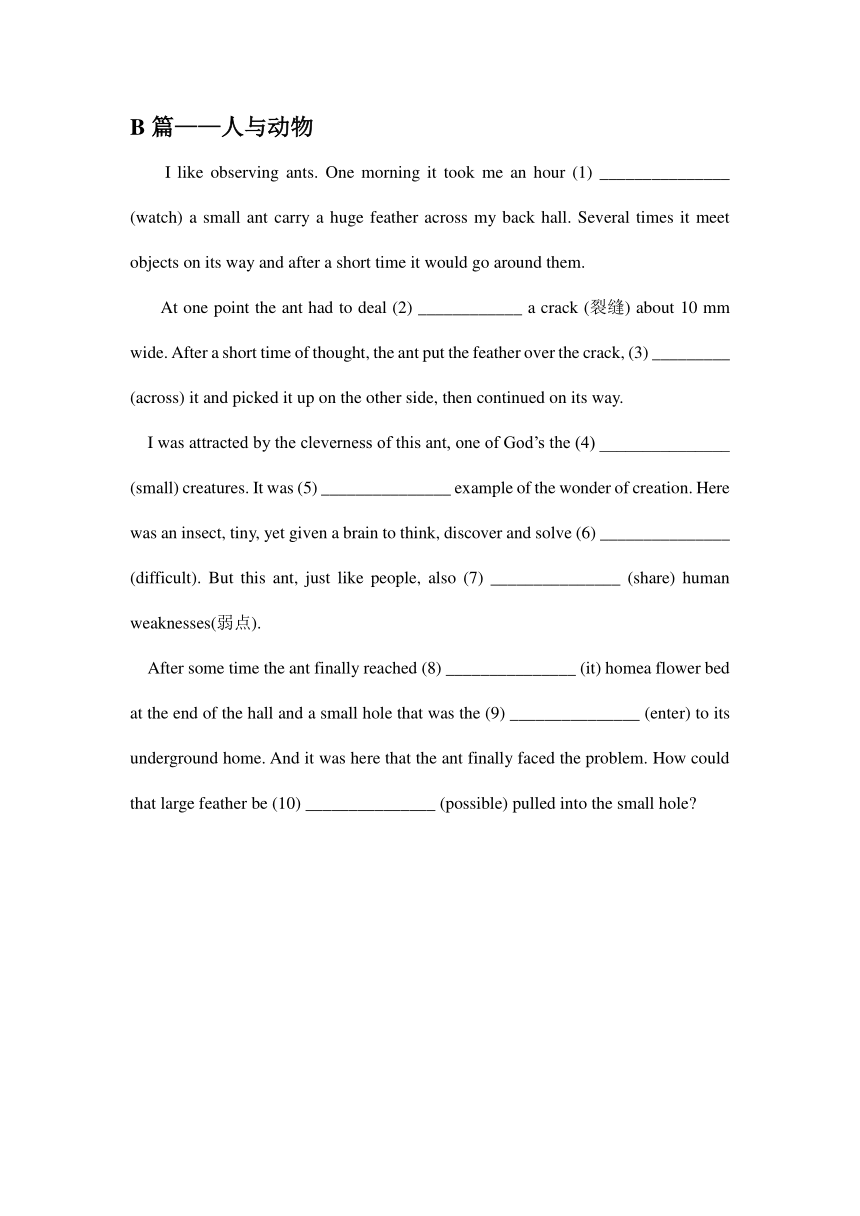
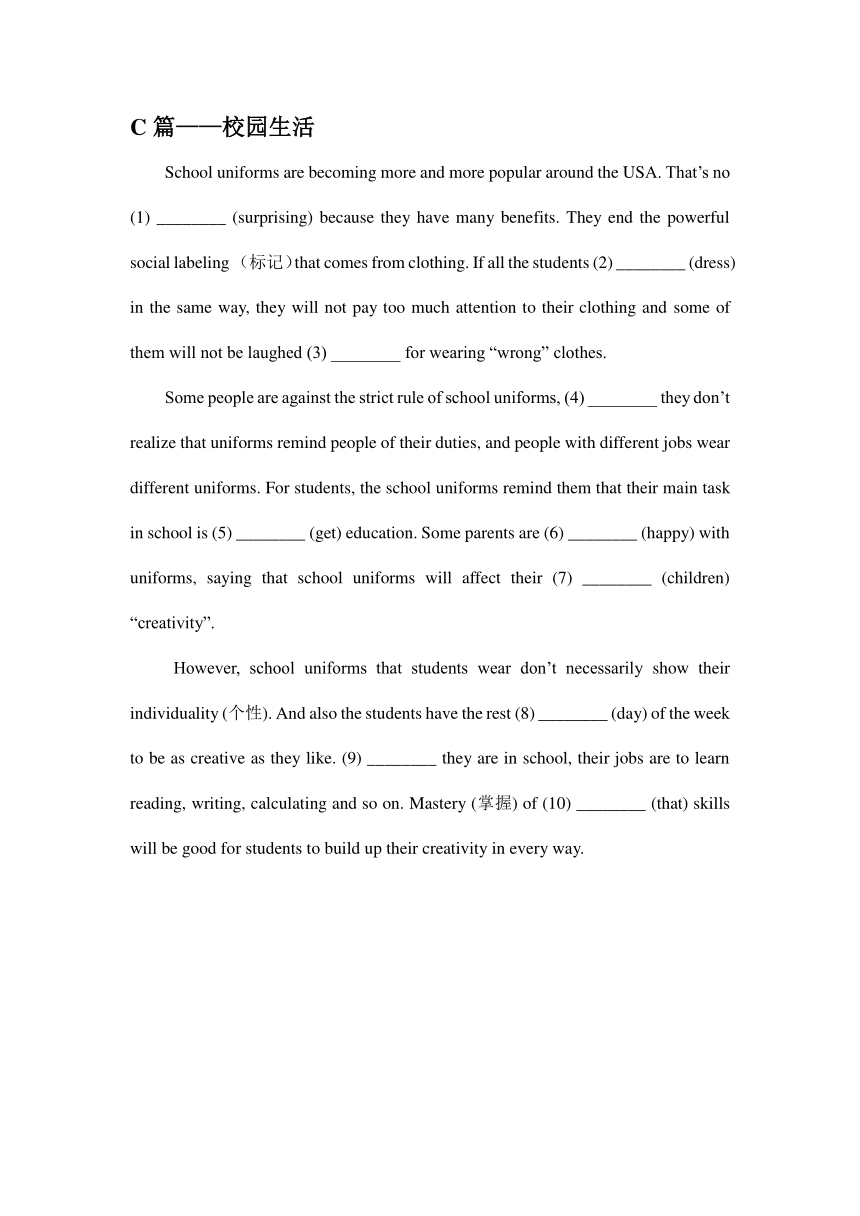
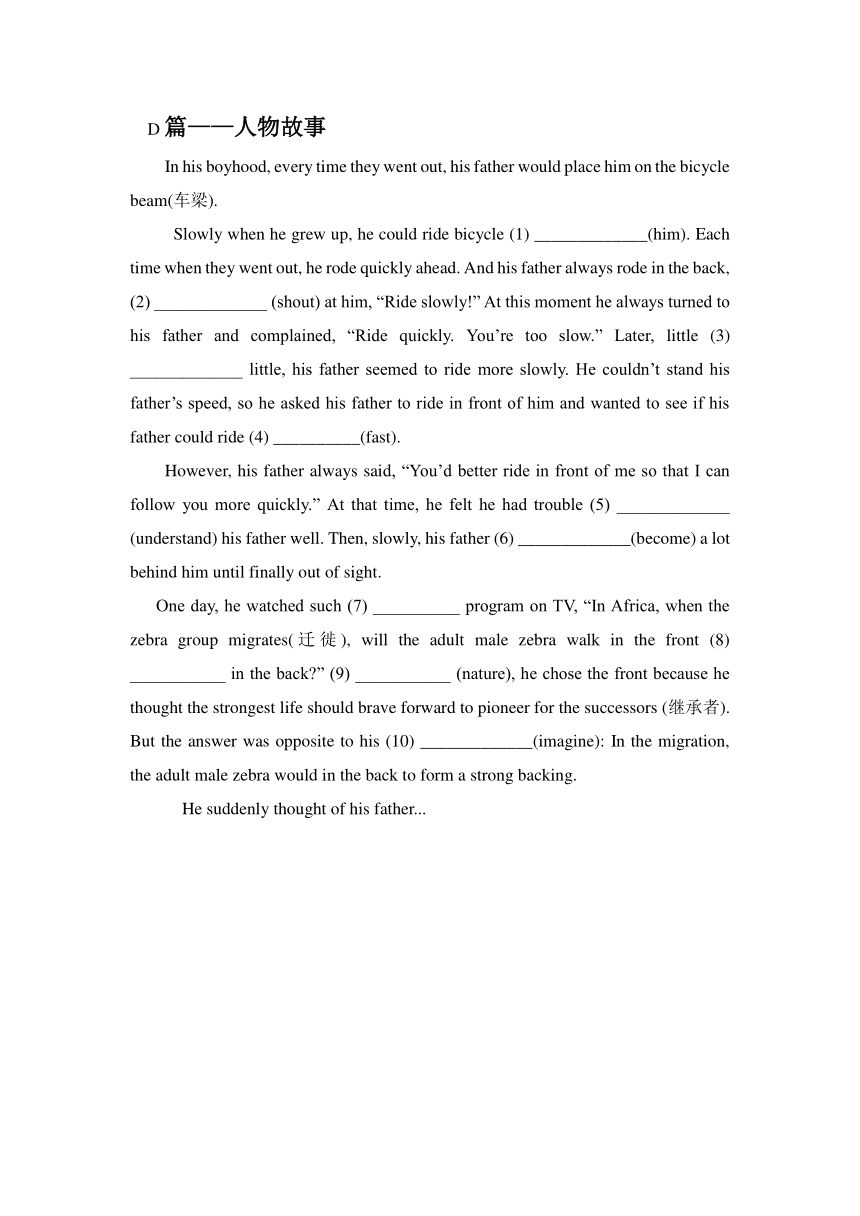
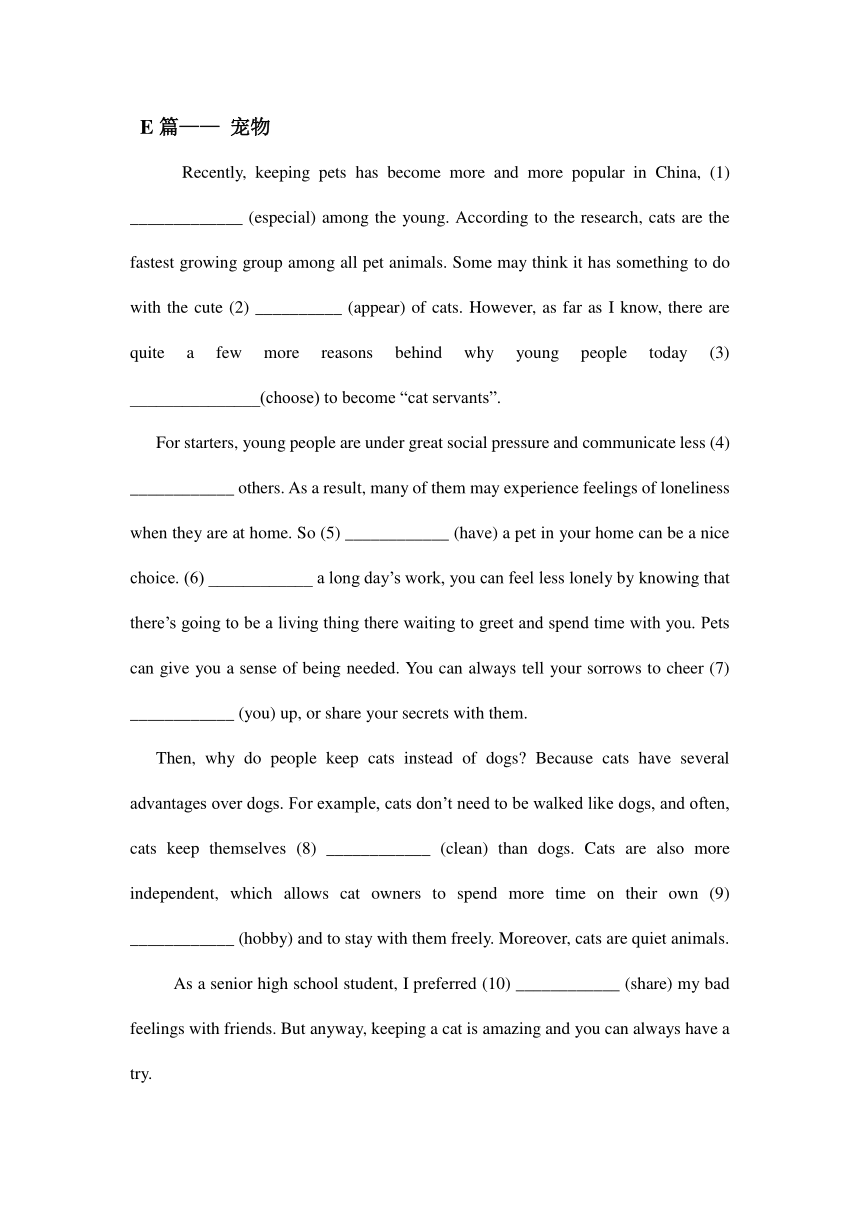
文档简介
深圳市中考英语专项复习
语法填空题型 题集
A篇——旅游
Alex and his parents were traveling from the north of England (1) ___________ Oxford. He was really excited and happy because he had (2) ___________ interview at Oxford University. His (3) ___________ (parent) were taking him for his interview. His father was really happy as well (4) ___________ he had just spent time on a new satellite system. (5) ___________ the help of this system, people won’t be lost any more.
___________ Alex’s mother thought it was a waste of time, and a good map is much (7) ___________ (cheap). His father (8) ___________ (agree) with her. He thought it was more convenient for people (9) ____________ (follow) the system to drive. When they (10) _____________ (discuss) which was better, Alex found that they had arrived at the gate of Oxford University.
B篇——人与动物
I like observing ants. One morning it took me an hour (1) _______________ (watch) a small ant carry a huge feather across my back hall. Several times it meet objects on its way and after a short time it would go around them.
At one point the ant had to deal (2) ____________ a crack (裂缝) about 10 mm wide. After a short time of thought, the ant put the feather over the crack, (3) _________ (across) it and picked it up on the other side, then continued on its way.
I was attracted by the cleverness of this ant, one of God’s the (4) _______________ (small) creatures. It was (5) _______________ example of the wonder of creation. Here was an insect, tiny, yet given a brain to think, discover and solve (6) _______________ (difficult). But this ant, just like people, also (7) _______________ (share) human weaknesses(弱点).
After some time the ant finally reached (8) _______________ (it) homea flower bed at the end of the hall and a small hole that was the (9) _______________ (enter) to its underground home. And it was here that the ant finally faced the problem. How could that large feather be (10) _______________ (possible) pulled into the small hole
C篇——校园生活
School uniforms are becoming more and more popular around the USA. That’s no (1) ________ (surprising) because they have many benefits. They end the powerful social labeling (标记)that comes from clothing. If all the students (2) ________ (dress) in the same way, they will not pay too much attention to their clothing and some of them will not be laughed (3) ________ for wearing “wrong” clothes.
Some people are against the strict rule of school uniforms, (4) ________ they don’t realize that uniforms remind people of their duties, and people with different jobs wear different uniforms. For students, the school uniforms remind them that their main task in school is (5) ________ (get) education. Some parents are (6) ________ (happy) with uniforms, saying that school uniforms will affect their (7) ________ (children) “creativity”.
However, school uniforms that students wear don’t necessarily show their individuality (个性). And also the students have the rest (8) ________ (day) of the week to be as creative as they like. (9) ________ they are in school, their jobs are to learn reading, writing, calculating and so on. Mastery (掌握) of (10) ________ (that) skills will be good for students to build up their creativity in every way.
D篇——人物故事
In his boyhood, every time they went out, his father would place him on the bicycle beam(车梁).
Slowly when he grew up, he could ride bicycle (1) _____________(him). Each time when they went out, he rode quickly ahead. And his father always rode in the back, (2) _____________ (shout) at him, “Ride slowly!” At this moment he always turned to his father and complained, “Ride quickly. You’re too slow.” Later, little (3) _____________ little, his father seemed to ride more slowly. He couldn’t stand his father’s speed, so he asked his father to ride in front of him and wanted to see if his father could ride (4) __________(fast).
However, his father always said, “You’d better ride in front of me so that I can follow you more quickly.” At that time, he felt he had trouble (5) _____________ (understand) his father well. Then, slowly, his father (6) _____________(become) a lot behind him until finally out of sight.
One day, he watched such (7) __________ program on TV, “In Africa, when the zebra group migrates(迁徙), will the adult male zebra walk in the front (8) ___________ in the back ” (9) ___________ (nature), he chose the front because he thought the strongest life should brave forward to pioneer for the successors (继承者). But the answer was opposite to his (10) _____________(imagine): In the migration, the adult male zebra would in the back to form a strong backing.
He suddenly thought of his father...
E篇—— 宠物
Recently, keeping pets has become more and more popular in China, (1) _____________ (especial) among the young. According to the research, cats are the fastest growing group among all pet animals. Some may think it has something to do with the cute (2) __________ (appear) of cats. However, as far as I know, there are quite a few more reasons behind why young people today (3) _______________(choose) to become “cat servants”.
For starters, young people are under great social pressure and communicate less (4) ____________ others. As a result, many of them may experience feelings of loneliness when they are at home. So (5) ____________ (have) a pet in your home can be a nice choice. (6) ____________ a long day’s work, you can feel less lonely by knowing that there’s going to be a living thing there waiting to greet and spend time with you. Pets can give you a sense of being needed. You can always tell your sorrows to cheer (7) ____________ (you) up, or share your secrets with them.
Then, why do people keep cats instead of dogs Because cats have several advantages over dogs. For example, cats don’t need to be walked like dogs, and often, cats keep themselves (8) ____________ (clean) than dogs. Cats are also more independent, which allows cat owners to spend more time on their own (9) ____________ (hobby) and to stay with them freely. Moreover, cats are quiet animals.
As a senior high school student, I preferred (10) ____________ (share) my bad feelings with friends. But anyway, keeping a cat is amazing and you can always have a try.
F篇——自然灾害
My family lives very happily on a farm near a small town. My father always learns some information about weather through the TM, the Internet and newspapers.
One evening, he asked us (1) ___________ (meet) at the table after dinner. “I have some bad news,” he said. “The weather reports on the television warned that we would face (2) ___________ typhoon tomorrow.”
At 6.30 a.m. the next day, the winds started and the rain was falling (3) ___________ (heavy). There were new warnings that the sea level could go up as much as 5 meters.
The winds were terribly strong and tree (4) ___________(branch) were flying everywhere. Trees were falling down and the rain kept (5) ___________ (come) down.
Just after 10:30, the wind stopped suddenly-it was strangely calm and (6) ___________ sun was shining. Then the winds came howling(咆哮) again, but this time (7) ___________ (much) rain fell. There were many flying things and the storm (8) ___________ (come) in. Everything within 1 kilometer of the coast was flooded-there was fish in the streets. Now the winds were dying down, (9) ___________ the rain was still falling.
After another two hours, the wind came to a stop at last. My home was in a mess and my mum burnt her arm when the hot water from the stove hit her skin. We were all frightened, but we were all safe, (10) ___________ (include) the cat.
G篇——宇宙太空
Recently, I have finished four space tasks. I stayed in space for more than 43 days, and (1) __________ (complete) six spacewalks for 43 hours and 13 minutes, so I have a lot of experience there. Today, I’d like (2) __________ (share) some information unusual: what it’s like to eat in space.
People often ask me if Tang—a kind of orange drink mix—is still taken in space. Don’t laugh, but we still drink it. Today’s space foods look like foods we’re used to (3) __________(eat) every day. Foods, like nuts or cakes, can be taken on board as much as (4) __________(possibly). But things like macaroni (通心面) or noodles would be specially prepared, then kept and packaged (打包) to stop them going everywhere. It’s (5) __________ difficult but necessary job. However, food on a space task can be quite rich and various, can’t it
The microgravity (微重力) on the space station changes things (6) __________ some ways. For one thing, there is no “up” or “down” in space. It also changes how things taste. On Earth, most of your blood is usually below your heart. In space, you’re weightless, (7) __________the sharing of blood in your body changes. One result is lowering your sense of taste, at (8) __________(little) at first. This happened to me on one task. When I took sugar candy, I wasn’t able to taste it until the (9) __________(nine) day.
Food can be a real (10) __________(happy) in space. For us, eating is more than just getting power and energy. Familiar foods and tastes can remind us of home and keep us feeling that we still keep in touch with Earth.
参考答案 使用说明:
1. 解析部分:括号内为考点分析和技巧(如固定搭配、时态、词性转换等)。
2. 纯答案版:可直接复制用于校对或背诵。
A篇——旅游
1. to(固定搭配:travel from...to...)
2. an(interview以元音音素开头,用an)
3. parents(复数,与“were”一致)
4. because(连词,解释父亲高兴的原因)
5. With(固定搭配:with the help of)
6. But(转折连词,母亲与父亲观点对立)
7. cheaper(比较级,与“waste of time”对比)
8. disagreed(过去时,与上下文时态一致)
9. to follow(it is + adj. + for sb. to do结构)
10. were discussing(过去进行时,描述当时正在发生的动作)
B篇——人与动物
1. to watch(it takes time to do sth.)
2. with(固定搭配:deal with)
3. crossed(并列谓语,与“put”“picked”时态一致)
4. smallest(最高级,强调“最小的生物之一”)
5. an(example以元音音素开头)
6. difficulties(复数,泛指“困难”)
7. shares(一般现在时,与“people”类比)
8. its(形容词性物主代词,指代蚂蚁)
9. entrance(名词,与“hole”并列)
10. possibly(副词修饰“pulled”)
C篇——校园生活
1. surprise(固定搭配:That’s no surprise)
2. are dressed(被动语态,学生“被穿着”)
3. at(固定搭配:laugh at)
4. but(转折连词,前后句意对立)
5. to get(不定式作表语,表目的)
6. unhappy(形容词,与父母态度一致)
7. children’s(所有格,修饰“creativity”)
8. days(复数,the rest of后接可数名词复数)
9. When(时间状语从句)
10. these(指代前文的reading, writing等技能)
D篇——人物故事
1. himself(反身代词,强调“独自”)
2. shouting(现在分词作伴随状语)
3. by(固定搭配:little by little)
4. faster(比较级,与“slow”对比)
5. understanding(have trouble doing sth.)
6. became(过去时,描述过去的变化)
7. a(泛指“一个节目”)
8. or(选择疑问句连词)
9. Naturally(副词作状语,表“本能地”)
10. imagination(名词,与“answer”对应)
E篇——宠物
1. especially(副词,强调“特别是”)
2. appearance(名词,与“cute”搭配)
3. choose(一般现在时,描述现状)
4. with(固定搭配:communicate with)
5. having(动名词作主语)
6. After(时间介词,与“long day”搭配)
7. yourself(反身代词,cheer oneself up)
8. cleaner(比较级,与dogs对比)
9. hobbies(复数,与“their”一致)
10. to share(prefer to do sth.)
F篇——自然灾害
1. to meet(ask sb. to do sth.)
2. a(泛指“一场台风”)
3. heavily(副词修饰“was falling”)
4. branches(复数,与“were flying”一致)
5. coming(keep doing sth.)
6. the(特指“太阳”)
7. less(比较级,与“more”反义)
8. came(过去时,描述过去事件)
9. but(转折连词,前后句意对比)
10. including(介词,表“包括”)
G篇——宇宙太空
1. completed(并列谓语,与“stayed”时态一致)
2. to share(would like to do sth.)
3. eating(be used to doing习惯做某事)
4. possible(as much as possible固定搭配)
5. a(泛指“一项工作”)
6. in(固定搭配:in some ways)
7. so(连词,表结果)
8. least(固定搭配:at least)
9. ninth(序数词,表“第九天”)
10. happiness(名词,作表语)
答案合集(纯答案版)
A篇: 1.to 2.an 3.parents 4.because 5.With 6.But 7.cheaper 8.disagreed 9.to follow 10.were discussing
B篇: 1.to watch 2.with 3.crossed 4.smallest 5.an 6.difficulties 7.shares 8.its 9.entrance 10.possibly
C篇: 1.surprise 2.are dressed 3.at 4.but 5.to get 6.unhappy 7.children’s 8.days 9.When 10.these
D篇: 1.himself 2.shouting 3.by 4.faster 5.understanding 6.became 7.a 8.or 9.Naturally 10.imagination
E篇: 1.especially 2.appearance 3.choose 4.with 5.having 6.After 7.yourself 8.cleaner 9.hobbies 10.to share
F篇: 1.to meet 2.a 3.heavily 4.branches 5.coming 6.the 7.less 8.came 9.but 10.including
G篇: 1.completed 2.to share 3.eating 4.possible 5.a 6.in 7.so 8.least 9.ninth 10.happiness
语法填空题型 题集
A篇——旅游
Alex and his parents were traveling from the north of England (1) ___________ Oxford. He was really excited and happy because he had (2) ___________ interview at Oxford University. His (3) ___________ (parent) were taking him for his interview. His father was really happy as well (4) ___________ he had just spent time on a new satellite system. (5) ___________ the help of this system, people won’t be lost any more.
___________ Alex’s mother thought it was a waste of time, and a good map is much (7) ___________ (cheap). His father (8) ___________ (agree) with her. He thought it was more convenient for people (9) ____________ (follow) the system to drive. When they (10) _____________ (discuss) which was better, Alex found that they had arrived at the gate of Oxford University.
B篇——人与动物
I like observing ants. One morning it took me an hour (1) _______________ (watch) a small ant carry a huge feather across my back hall. Several times it meet objects on its way and after a short time it would go around them.
At one point the ant had to deal (2) ____________ a crack (裂缝) about 10 mm wide. After a short time of thought, the ant put the feather over the crack, (3) _________ (across) it and picked it up on the other side, then continued on its way.
I was attracted by the cleverness of this ant, one of God’s the (4) _______________ (small) creatures. It was (5) _______________ example of the wonder of creation. Here was an insect, tiny, yet given a brain to think, discover and solve (6) _______________ (difficult). But this ant, just like people, also (7) _______________ (share) human weaknesses(弱点).
After some time the ant finally reached (8) _______________ (it) homea flower bed at the end of the hall and a small hole that was the (9) _______________ (enter) to its underground home. And it was here that the ant finally faced the problem. How could that large feather be (10) _______________ (possible) pulled into the small hole
C篇——校园生活
School uniforms are becoming more and more popular around the USA. That’s no (1) ________ (surprising) because they have many benefits. They end the powerful social labeling (标记)that comes from clothing. If all the students (2) ________ (dress) in the same way, they will not pay too much attention to their clothing and some of them will not be laughed (3) ________ for wearing “wrong” clothes.
Some people are against the strict rule of school uniforms, (4) ________ they don’t realize that uniforms remind people of their duties, and people with different jobs wear different uniforms. For students, the school uniforms remind them that their main task in school is (5) ________ (get) education. Some parents are (6) ________ (happy) with uniforms, saying that school uniforms will affect their (7) ________ (children) “creativity”.
However, school uniforms that students wear don’t necessarily show their individuality (个性). And also the students have the rest (8) ________ (day) of the week to be as creative as they like. (9) ________ they are in school, their jobs are to learn reading, writing, calculating and so on. Mastery (掌握) of (10) ________ (that) skills will be good for students to build up their creativity in every way.
D篇——人物故事
In his boyhood, every time they went out, his father would place him on the bicycle beam(车梁).
Slowly when he grew up, he could ride bicycle (1) _____________(him). Each time when they went out, he rode quickly ahead. And his father always rode in the back, (2) _____________ (shout) at him, “Ride slowly!” At this moment he always turned to his father and complained, “Ride quickly. You’re too slow.” Later, little (3) _____________ little, his father seemed to ride more slowly. He couldn’t stand his father’s speed, so he asked his father to ride in front of him and wanted to see if his father could ride (4) __________(fast).
However, his father always said, “You’d better ride in front of me so that I can follow you more quickly.” At that time, he felt he had trouble (5) _____________ (understand) his father well. Then, slowly, his father (6) _____________(become) a lot behind him until finally out of sight.
One day, he watched such (7) __________ program on TV, “In Africa, when the zebra group migrates(迁徙), will the adult male zebra walk in the front (8) ___________ in the back ” (9) ___________ (nature), he chose the front because he thought the strongest life should brave forward to pioneer for the successors (继承者). But the answer was opposite to his (10) _____________(imagine): In the migration, the adult male zebra would in the back to form a strong backing.
He suddenly thought of his father...
E篇—— 宠物
Recently, keeping pets has become more and more popular in China, (1) _____________ (especial) among the young. According to the research, cats are the fastest growing group among all pet animals. Some may think it has something to do with the cute (2) __________ (appear) of cats. However, as far as I know, there are quite a few more reasons behind why young people today (3) _______________(choose) to become “cat servants”.
For starters, young people are under great social pressure and communicate less (4) ____________ others. As a result, many of them may experience feelings of loneliness when they are at home. So (5) ____________ (have) a pet in your home can be a nice choice. (6) ____________ a long day’s work, you can feel less lonely by knowing that there’s going to be a living thing there waiting to greet and spend time with you. Pets can give you a sense of being needed. You can always tell your sorrows to cheer (7) ____________ (you) up, or share your secrets with them.
Then, why do people keep cats instead of dogs Because cats have several advantages over dogs. For example, cats don’t need to be walked like dogs, and often, cats keep themselves (8) ____________ (clean) than dogs. Cats are also more independent, which allows cat owners to spend more time on their own (9) ____________ (hobby) and to stay with them freely. Moreover, cats are quiet animals.
As a senior high school student, I preferred (10) ____________ (share) my bad feelings with friends. But anyway, keeping a cat is amazing and you can always have a try.
F篇——自然灾害
My family lives very happily on a farm near a small town. My father always learns some information about weather through the TM, the Internet and newspapers.
One evening, he asked us (1) ___________ (meet) at the table after dinner. “I have some bad news,” he said. “The weather reports on the television warned that we would face (2) ___________ typhoon tomorrow.”
At 6.30 a.m. the next day, the winds started and the rain was falling (3) ___________ (heavy). There were new warnings that the sea level could go up as much as 5 meters.
The winds were terribly strong and tree (4) ___________(branch) were flying everywhere. Trees were falling down and the rain kept (5) ___________ (come) down.
Just after 10:30, the wind stopped suddenly-it was strangely calm and (6) ___________ sun was shining. Then the winds came howling(咆哮) again, but this time (7) ___________ (much) rain fell. There were many flying things and the storm (8) ___________ (come) in. Everything within 1 kilometer of the coast was flooded-there was fish in the streets. Now the winds were dying down, (9) ___________ the rain was still falling.
After another two hours, the wind came to a stop at last. My home was in a mess and my mum burnt her arm when the hot water from the stove hit her skin. We were all frightened, but we were all safe, (10) ___________ (include) the cat.
G篇——宇宙太空
Recently, I have finished four space tasks. I stayed in space for more than 43 days, and (1) __________ (complete) six spacewalks for 43 hours and 13 minutes, so I have a lot of experience there. Today, I’d like (2) __________ (share) some information unusual: what it’s like to eat in space.
People often ask me if Tang—a kind of orange drink mix—is still taken in space. Don’t laugh, but we still drink it. Today’s space foods look like foods we’re used to (3) __________(eat) every day. Foods, like nuts or cakes, can be taken on board as much as (4) __________(possibly). But things like macaroni (通心面) or noodles would be specially prepared, then kept and packaged (打包) to stop them going everywhere. It’s (5) __________ difficult but necessary job. However, food on a space task can be quite rich and various, can’t it
The microgravity (微重力) on the space station changes things (6) __________ some ways. For one thing, there is no “up” or “down” in space. It also changes how things taste. On Earth, most of your blood is usually below your heart. In space, you’re weightless, (7) __________the sharing of blood in your body changes. One result is lowering your sense of taste, at (8) __________(little) at first. This happened to me on one task. When I took sugar candy, I wasn’t able to taste it until the (9) __________(nine) day.
Food can be a real (10) __________(happy) in space. For us, eating is more than just getting power and energy. Familiar foods and tastes can remind us of home and keep us feeling that we still keep in touch with Earth.
参考答案 使用说明:
1. 解析部分:括号内为考点分析和技巧(如固定搭配、时态、词性转换等)。
2. 纯答案版:可直接复制用于校对或背诵。
A篇——旅游
1. to(固定搭配:travel from...to...)
2. an(interview以元音音素开头,用an)
3. parents(复数,与“were”一致)
4. because(连词,解释父亲高兴的原因)
5. With(固定搭配:with the help of)
6. But(转折连词,母亲与父亲观点对立)
7. cheaper(比较级,与“waste of time”对比)
8. disagreed(过去时,与上下文时态一致)
9. to follow(it is + adj. + for sb. to do结构)
10. were discussing(过去进行时,描述当时正在发生的动作)
B篇——人与动物
1. to watch(it takes time to do sth.)
2. with(固定搭配:deal with)
3. crossed(并列谓语,与“put”“picked”时态一致)
4. smallest(最高级,强调“最小的生物之一”)
5. an(example以元音音素开头)
6. difficulties(复数,泛指“困难”)
7. shares(一般现在时,与“people”类比)
8. its(形容词性物主代词,指代蚂蚁)
9. entrance(名词,与“hole”并列)
10. possibly(副词修饰“pulled”)
C篇——校园生活
1. surprise(固定搭配:That’s no surprise)
2. are dressed(被动语态,学生“被穿着”)
3. at(固定搭配:laugh at)
4. but(转折连词,前后句意对立)
5. to get(不定式作表语,表目的)
6. unhappy(形容词,与父母态度一致)
7. children’s(所有格,修饰“creativity”)
8. days(复数,the rest of后接可数名词复数)
9. When(时间状语从句)
10. these(指代前文的reading, writing等技能)
D篇——人物故事
1. himself(反身代词,强调“独自”)
2. shouting(现在分词作伴随状语)
3. by(固定搭配:little by little)
4. faster(比较级,与“slow”对比)
5. understanding(have trouble doing sth.)
6. became(过去时,描述过去的变化)
7. a(泛指“一个节目”)
8. or(选择疑问句连词)
9. Naturally(副词作状语,表“本能地”)
10. imagination(名词,与“answer”对应)
E篇——宠物
1. especially(副词,强调“特别是”)
2. appearance(名词,与“cute”搭配)
3. choose(一般现在时,描述现状)
4. with(固定搭配:communicate with)
5. having(动名词作主语)
6. After(时间介词,与“long day”搭配)
7. yourself(反身代词,cheer oneself up)
8. cleaner(比较级,与dogs对比)
9. hobbies(复数,与“their”一致)
10. to share(prefer to do sth.)
F篇——自然灾害
1. to meet(ask sb. to do sth.)
2. a(泛指“一场台风”)
3. heavily(副词修饰“was falling”)
4. branches(复数,与“were flying”一致)
5. coming(keep doing sth.)
6. the(特指“太阳”)
7. less(比较级,与“more”反义)
8. came(过去时,描述过去事件)
9. but(转折连词,前后句意对比)
10. including(介词,表“包括”)
G篇——宇宙太空
1. completed(并列谓语,与“stayed”时态一致)
2. to share(would like to do sth.)
3. eating(be used to doing习惯做某事)
4. possible(as much as possible固定搭配)
5. a(泛指“一项工作”)
6. in(固定搭配:in some ways)
7. so(连词,表结果)
8. least(固定搭配:at least)
9. ninth(序数词,表“第九天”)
10. happiness(名词,作表语)
答案合集(纯答案版)
A篇: 1.to 2.an 3.parents 4.because 5.With 6.But 7.cheaper 8.disagreed 9.to follow 10.were discussing
B篇: 1.to watch 2.with 3.crossed 4.smallest 5.an 6.difficulties 7.shares 8.its 9.entrance 10.possibly
C篇: 1.surprise 2.are dressed 3.at 4.but 5.to get 6.unhappy 7.children’s 8.days 9.When 10.these
D篇: 1.himself 2.shouting 3.by 4.faster 5.understanding 6.became 7.a 8.or 9.Naturally 10.imagination
E篇: 1.especially 2.appearance 3.choose 4.with 5.having 6.After 7.yourself 8.cleaner 9.hobbies 10.to share
F篇: 1.to meet 2.a 3.heavily 4.branches 5.coming 6.the 7.less 8.came 9.but 10.including
G篇: 1.completed 2.to share 3.eating 4.possible 5.a 6.in 7.so 8.least 9.ninth 10.happiness
同课章节目录
- 词法
- 名词
- 动词和动词短语
- 动词语态
- 动词时态
- 助动词和情态动词
- 非谓语动词
- 冠词
- 代词
- 数词和量词
- 形容词副词及其比较等级
- 介词和介词短语
- 连词和感叹词
- 构词法
- 相似、相近词比较
- 句法
- 陈述句
- 一般疑问句和否定疑问句
- 特殊疑问句及选择疑问句
- 反意疑问句
- 存在句(There be句型)
- 宾语从句
- 定语从句
- 状语从句
- 主谓一致问题
- 简单句
- 并列句
- 复合句
- 主谓一致
- 主、表语从句
- 名词性从句
- 直接引语和间接引语
- 虚拟语气
- 感叹句
- 强调句
- 倒装句
- 祈使句
- 句子的成分
- 句子的分类
- 题型专区
- 单项选择部分
- 易错题
- 完形填空
- 阅读理解
- 词汇练习
- 听说训练
- 句型转换
- 补全对话
- 短文改错
- 翻译
- 书面表达
- 任务型阅读
- 语法填空
- 其他资料
